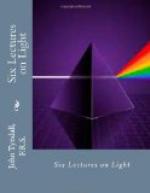Nevertheless this great theory of undulation, like many another truth, which in the long run has proved a blessing to humanity, had to establish, by hot conflict, its right to existence. Illustrious names were arrayed against it. It had been enunciated by Hooke, it had been expounded and applied by Huyghens, it had been defended by Euler. But they made no impression. And, indeed, the theory in their hands lacked the strength of a demonstration. It first took the form of a demonstrated verity in the hands of Thomas Young. He brought the waves of light to bear upon each other, causing them to support each other, and to extinguish each other at will. From their mutual actions he determined their lengths, and applied his knowledge in all directions. He finally showed that the difficulty of polarization yielded to the grasp of theory.
After him came Fresnel, whose transcendent mathematical abilities enabled him to give the theory a generality unattained by Young. He seized it in its entirety; followed the ether into the hearts of crystals of the most complicated structure, and into bodies subjected to strain and pressure. He showed that the facts discovered by Malus, Arago, Brewster, and Biot were so many ganglia, so to speak, of his theoretic organism, deriving from it sustenance and explanation. With a mind too strong for the body with which it was associated, that body became a wreck long before it had become old, and Fresnel died, leaving, however, behind him a name immortal in the annals of science.
One word more I should like to say regarding Fresnel. There are things better even than science. Character is higher than Intellect, but it is especially pleasant to those who wish to think well of human nature when high intellect and upright character are found combined. They were combined in this young Frenchman. In those hot conflicts of the undulatory theory, he stood forth as a man of integrity, claiming no more than his right, and ready to concede their rights to others. He at once recognized and acknowledged the merits of Thomas Young. Indeed, it was he, and his fellow-countryman Arago, who first startled England into the consciousness of the injustice done to Young in the ‘Edinburgh Review.’
I should like to read to you a brief extract from a letter written by Fresnel to Young in 1824, as it throws a pleasant light upon the character of the French philosopher. ‘For a long time,’ says Fresnel, ’that sensibility, or that vanity, which people call love of glory has been much blunted in me. I labour much less to catch the suffrages of the public, than to obtain that inward approval which has always been the sweetest reward of my efforts. Without doubt, in moments of disgust and discouragement, I have often needed the spur of vanity to excite me to pursue my researches. But all the compliments I have received from Arago, De la Place, and Biot never gave me so much pleasure as the discovery of a theoretic truth or the confirmation of a calculation by experiment.’




